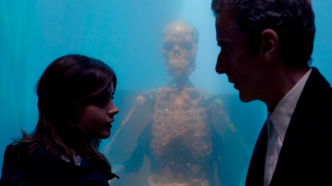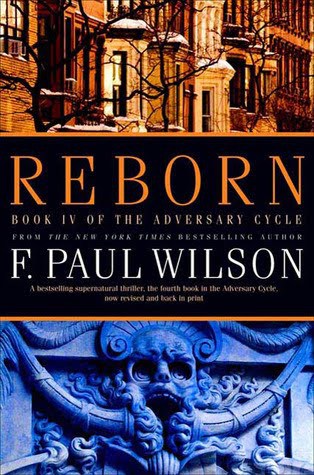 This article covers the episodes Dark Water and Death in Heaven, which together form a single Doctor Who story.
This article covers the episodes Dark Water and Death in Heaven, which together form a single Doctor Who story.
Once upon a time an old lady complained about Doctor Who to the BBC because she didn’t understand what a freeze frame was. Or more likely she understood it but had such a low opinion of the general public that she assumed they wouldn’t. The BBC could have robustly defended their position, but instead chose to roll over and appoint a new producer with strict instructions to boringize Doctor Who.
Fast forward 35 years or so, and we have Dark Water / Death in Heaven, a Doctor Who story that puts forward the idea that dead people experience what happens to them after death, feeling the pain of cremation. Some people expressed concerns about that, and here is what the BBC said in response:
Doctor Who is a family drama with a long tradition of tackling some of the more fundamental questions about life and death.
We were mindful of the themes explored in Dark Water and are confident that they are appropriate in the context of the heightened sci-fi world of the show.
The scene in which a character reveals 3W’s unconventional theory about the afterlife was preceded by the same character warning the Doctor and Clara several times that what they were about to hear could be distressing.
When the Doctor does hear these claims, he immediately pours scorn on them, dismissing them out of hand as a ‘con’ and a ‘racket’.
It transpires that he is correct, and the entire concept is revealed to be a scam perpetrated by Missy.
Well, let’s break that down.
- Doctor Who has a long tradition of tackling some of the more fundamental questions about life and death.
Wrong. Doctor Who has always been a show that shies away from the real consequences of death. Yes, it has a high body count, but that is used to tell stories, not to linger on the consequences for the victims or their families. In fact, Doctor Who actively runs away from those kinds of issues. Look how infrequently a companion dies. Only two stories actually did that and made the companion stay dead. The only story that you could maybe twist into being some kind of preparation for this is The Satan Pit, but you would be doing a lot of twisting. If we are talking about the “fundamental questions of life and death” then that’s a way of saying “the afterlife”, and Doctor Who has always avoided exploring that or taking a stand on it one way or another. Torchwood is a different matter, but that wasn’t a family show.
- It’s appropriate because it’s within the context of sci-fi.
Wrong. Doctor Who (and the wider genre of sci-fi, if you like) is all about holding up a mirror to our own lives, tackling themes that affect us in parallel. It does this constantly, nearly every week. If you hold up a mirror to a theme that has a bearing on real life then you are going to make people, children included, think about that theme. The blue box doesn’t make a jot of difference to that.
- We were told in advance that we were going to hear something distressing.
Being told something is going to be distressing doesn’t stop it being distressing when it happens.
- The concept is revealed to be a scam.
So what this all boils down to really is various different ways of saying: look, this isn’t real, it’s Doctor Who. It’s just the Master’s latest scam. Which is true, but none of that alters what this story does to the families watching, which is to put a concept into their heads, and that concept is dead people crying out “don’t cremate me” because they will feel their bodies burn. Danny even hears a man screaming because he has left his body to science. He is feeling himself being dissected. So the BBC basically tries to respond there by saying: all you people complaining, you don’t understand television. Exactly the response they should have given to Mary Whitehouse all those years ago. But it’s the wrong response now. Imagine a family watching this who has recently lost a relative and been to the funeral, and this story implants the idea in the child’s mind that his or her granny might have been able to feel what was happening to her dead body. Imagine being a parent having to deal with a child who is disturbed and troubled by that thought. A child will be perfectly capable of dwelling on it despite realising that they are watching something fictional, whilst possibly not yet capable of compartmentalising it.
If this was the only nasty thing Steven Moffat did here then it wouldn’t be quite so bad, but it happens within the context of a story that also does all of the following:
- Kills off Danny in a real-world manner, something Doctor Who virtually never does with a recurring character.
- Takes Clara to the utter depths of despair, and when she has hit rock bottom has the Doctor tell her to “go to hell”. He’s using an oh-so-clever little false metaphor word-play, but is this the time for the Doctor to play with her emotions for the sake of a pun?
- Kills off Osgood just as she seems to be on the verge of being the next companion.
- Uses the idea of dead bodies being reanimated as Cybermen, but crucially not just their bodies. The people are actually coming back to life when they have been dead for some time, and waking up as Cybermen. This includes the Brigadier, a character recently shown to have died in a touching tribute to the actor who had passed away in real life.
And then we come to the worst thing about this whole sorry shambles, but before I get to that I want to make a couple of things clear, because I know I am going to have to end this on a negative.
Firstly, there are things about this story that are utterly brilliant. Of course there are – it’s Doctor Who written by Steven Moffat. The Cybermen are more effective that they have been in virtually all their appearances since the Sixties, and the approach to conversion is shown with realism rather than what Nightmare in Silver did, which was to stick a few things and a couple of flashing lights on people’s faces and then remove them with not a scar in sight. The skeletons in the water turning out to be Cybermen is fabulously creepy. Missy is completely magnificent. Clara’s bluff at the beginning of Death in Heaven leading into her version of the opening titles: sublime.
Secondly, I love Doctor Who. When I set up this blog I wanted to find all the good and interesting things to say about Doctor Who stories. There are plenty of click-baity blogs out there that poke fun at everything and do very well as a result, but The View from the Junkyard isn’t one of those and never will be. But I knew right from the start that there were going to be one or two stories like this that were going to be very difficult to write about because they are simply irredeemably nasty. And when I say “one or two”, I mean that quite literally. This is “one” and we haven’t looked at “two” yet. Doctor Who is almost universally wonderful.
But not today. Because now we need to look at the final nail in this story’s coffin, the scene that should have resulting in Steven Moffat being removed from his role as showrunner, especially when viewed cumulatively with everything else that happens in this story.
It has been long established that the TARDIS is a living being, right from the very earliest days of Doctor Who, and this is an idea that has continued through all five decades of the show. Quite recently we have seen the TARDIS actually able to speak to the Doctor in the form of a woman, and their long relationship explored. The TARDIS is a female entity, taking the Doctor off on his adventures and often deciding where he needs to be. She chose him.
 And then the Doctor gets angry, and punches her. And he doesn’t just hit her once. Like an abusive husband inflicting domestic violence on his wife he flies into a rage because he didn’t get what he wanted, and he hits her again, and again and again. I suppose that BBC spokesperson would say this is all fine, because it’s sci-fi. But this is really not ok. This is our hero, doing the thematic equivalent of a man smashing a woman’s face to a pulp because he’s in a bad mood. Even if you simply look at the TARDIS as an inanimate object, this is still a man taking out his frustration by using his fists. If he is supposed to be a role model for our sons, then it really is time for a change. RP
And then the Doctor gets angry, and punches her. And he doesn’t just hit her once. Like an abusive husband inflicting domestic violence on his wife he flies into a rage because he didn’t get what he wanted, and he hits her again, and again and again. I suppose that BBC spokesperson would say this is all fine, because it’s sci-fi. But this is really not ok. This is our hero, doing the thematic equivalent of a man smashing a woman’s face to a pulp because he’s in a bad mood. Even if you simply look at the TARDIS as an inanimate object, this is still a man taking out his frustration by using his fists. If he is supposed to be a role model for our sons, then it really is time for a change. RP
The view from across the pond:
William Butler Yeats said rather poetically “things fall apart”. The Doctor, in his seventh incarnation said it a bit more enjoyably: “time and tide melt the snowman.” Forgiving the silly malapropism, there is truth in the words: time does destroy things. But it was probably said best by Tom Baker’s Doctor when he said “entropy increases” and like him, I’ve never heard truer words spoken. Typically, it’s a gradual increase and if the Daleks would just be patient, they don’t need a Time Destructor to accelerate that process. Sooner or later, things fall apart as entropy increases and ultimately melts the snowman. The snowman isn’t the only one susceptible to the effects of time; so is the Doctor.
Dark Water and Death in Heaven is the two-part finale to Peter Capaldi’s first season as the Doctor. Not unlike most seasons, this one suffered its share of ups and downs. The “ups” were often quite good, but the “downs” were rather bad, but this finale just proved the old adage that things fall apart. Stephen Moffat, who wrote the finale, likes to come up with cool ideas, and credit where due, he is good at it. But he fails to connect them in a meaningful way. Take the titular Dark Water, for instance. What function does it serve other than to hide the Cybermen shells? There is no need to hide microscopic cybermites with its unusual properties, because microscopic can’t be seen with the naked eye anyway! It was merely a means by which the Cybermen could hide in plain sight only. And even that was not done well because, visually, when these Cybermen are activated, their skeletons are what the audience sees moving but if they are supposedly just hiding their metal exoskeletons, why do we see the bone of the skeleton pressing a button? There should be an few millimeter gap between the button and the finger because the cyber exoskeleton would have been between bone and button. These ideas that are thrown in like the kitchen sink but for no good reason. It’s what we call throwing spaghetti at the wall to see what sticks.
And it gets worse; useless dark water is just the start. Danny Pink, former military man, does not know how to cross a street and dies trying. Ignominious demise, to say the least! Clara is broken by it, but not really because the Moffat regime is all about “good guys lie” (a sentiment I’ll come back to below). Missy’s big reveal as the regenerated Master complete with kissing and holding the Doctors hand on her heart is embarrassing and only works at all because Michelle Gomez is magnificent in the role, but even her acting barely keeps this one above those dark waters… Cybermen can fly but not run like the Flash which was introduced just over a season ago (why keep upgrades, when we can just revamp the whole damned thing each time). We see Osgood get killed off… a crime Russell T. Davies would never have allowed! And Clara finally gets top billing as the Doctor… YES, readers, she claims to be the Doctor and that Clara Oswald is not real solely so she can get top billing in the episode. (Or maybe it was to fool the Cybermen. I won’t pretend I didn’t like the close up of her eyes in the credits but come on, it was a weak strategy.) I’ll sound a bit like an infomercial salesman, but wait, that’s not all. We finally get a look at the afterlife and learn that when we die, our souls stay trapped in our bodies and feel everything that happens to us.
Now look, I think Doctor Who is better than most shows for experimenting and giving us something new but there’s risky and then there’s distasteful and I think this idea crossed a line. The whole series is fiction but that doesn’t mean the writers should be ignorant of offending people. It’s one thing to say something like telling a Rutan you don’t like his face and another with insinuating that our departed loved ones are in constant pain.
That said, the episode is not all bad. The opening with Clara betraying the Doctor, while horrible, is handled well by the Doctor’s fantastic reply: “do you think I care so little for you that betraying me would make any difference?” This is the sort of lesson that Capaldi’s Doctor was known for especially in the end: being kind, forgiving, caring. He may have come off cold, but he cares deeply and that took away a lot of the sting of the otherwise abusive scene. But, alas, that’s what Clara had deteriorated into at the hand of Moffat, but at least he didn’t forget who the Doctor is. (Yet…)
Then there’s the scene where the Doctor is blasted out of the plane and is plummeting to his death… It may be silly. It may even harken back to the 1989 Batman… but seeing the Doctor catch up to the TARDIS then fly it above the clouds… well, I can’t fault Missy’s aide when his gleeful excitement overrides his logic for self-preservation! It does make for a wonderful scene. And though I’m on the fence about it being the right call or not, discovering that the one good Cyberman was the Brigadier…. Well that was moving, even if I don’t know that it’s a good move.
But the ramifications of this episode… there’s a lot to take in also. Cyber-Danny overrides Cyberconversion. Maybe these Cybermen really are not that scary after all. Can more people do this, if Craig (Closing Time) and Danny can? And can we ever have an episode with a cemetery again? They should all be empty now, courtesy of the dark water/cyberrain. Gone is the fear factor of a good cemetery! (I guess Doctor Who never did that much with them anyway…)
And with the episode ending, there are more lies between Clara and the Doctor. At least now there’s the sense that they are lying to spare each other’s feelings. But Moffat had become far too accustomed to “the Doctor lies” as a go-to statement which is a terrible message for fans, especially the young ones. I think another short-sighted element that has been allowed far too much usage is “shut up”. It seems to be used these days with some comedic effect in mind, but have your kid tell you to shup up and that kid may find him or herself grounded for a month. It’s not a good thing to be making light of and another example of the merits of a writer who knows his/her audience. Moffat seems to have lost the plot, so to speak.
But it wasn’t until season 9 that entropy would increase to the level of using a Time Destructor. That’s when the snowman has been reduced to even less than a puddle. More on that when we get there… ML
Advertisements Share this:




